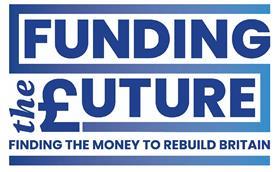It is time to create a national capital projects delivery unit to ensure we really learn lessons and avoid wasting time and money over and over again, writes Beth West

I was delighted to see the publication of the 10-year infrastructure strategy and the government recognising the importance of infrastructure to improving the life opportunities of the country. What I found disappointing was that it did not dedicate any time to addressing a common point of failure in such projects ŌĆō public sector capability that is too often, through no fault of their own, ŌĆ£fat and/or dumbŌĆØ.

While much space was dedicated to the work of NISTA to ensure that the strategy is delivered and provide assurance, nothing was said about how these projects will be delivered and the capability needed to do so. To achieve those improved life opportunities for the country, we need more than NISTA. We need a better way to be the client in order to deliver all public sector projects successfully.
I have spent a large majority of my career working for client organisations, mainly in the public sector, and of that a large proportion of ŌĆ£pop-upŌĆØ clients: HS2, East West Rail and more recently, supporting the New Hospital Programme. Much has been written over many years about how to be an intelligent client ŌĆō or capable owner, if you prefer.
>> Also read: If I were the chancellor: how to finance infrastructure when thereŌĆÖs not enough money
>> Also read: LetŌĆÖs harness the power of the incomplete client
And I have spent too many hours of my life talking with people who have limited experience of major capital delivery about whether one should be a thin client or a thick client. (For the uninitiated, a thin client has a small permanent staff and procures something like a programme development/delivery partner, while a thick client instead hires that capability as permanent staff.) In the public sector, you sometimes also have to face these questions alongside restrictions on headcount, budgets, salaries and often all three.
In the major projects that I have been involved with, I have also observed a tendency to start everything from scratch: new delivery models, new processes, new systems, new governance. Many years ago, I had reflected on why everything seemed to take so long to deliver compared to my banking days. I realised that, when I was arranging project finance loans for power plants and telecoms networks, we were literally cutting and pasting the common elements from the last deal and only adapting them for the unique features of the current project.
I have found this need to reinvent the wheel particularly frustrating in the project management office/project controls space in government projects because it means that we are doing a terrible job at compiling comparable data as we keep starting from scratch
We knew that 80-90% of what we were putting in place would work because we did it the last time, and it also allowed us to focus on the stuff that might emerge as a different risk. Yet there is some sort of strange ego thing on capital projects that means that, if we havenŌĆÖt created it ourselves, itŌĆÖs not going to be good enough.
I have found this need to reinvent the wheel particularly frustrating in the project management office/project controls space in government projects because it means that we are doing a terrible job at compiling comparable data as we keep starting from scratch. When I was developing commercial offices, we had comparable data across a huge array of buildings, which was instrumental in understanding where there were outliers in costs so that we could focus on how to bring the costs back into line; like how we focused on those unique risks in my banking days.
Establishing new clients for every government project and continuing to debate its form wastes time and money. Once a project is delivered, the project teams all disburse and work on other things. Despite our endless ŌĆ£lessons learntŌĆØ exercises, I have found that these are mainly performative and those lessons tend to live on shelves gathering dust, rather than in the minds of the team working on the next project.
Therefore, I believe that it is time to create a national capital projects delivery unit ŌĆō or a single intelligent client organisation that can deliver national and local projects across the country. Despite all of our talk of intelligent clienting, we seem to fail miserably at focusing on developing the capability that would allow us to consistently be one.
Clienting is a different set of skills than policy creation, sponsorship and construction delivery. Yet it is not treated as a desired profession that people can proudly build their careers around, despite being the entity that is making the key decisions on what will be delivered.
In my experience, we tend to emulate the structures of the client as if we are the contractor, focused on on-site delivery. However, that is what we procure contractors to do for us, and no matter how thick a client we are, the public sector is still not going to become a contractor and deliver the inputs needed to complete the project.
Policy making and sponsorship involves establishing the outcomes that we are trying to achieve, but they are neither engaging with stakeholders nor procuring the supply chain.
The client role ŌĆō thin, thick, intelligent or otherwise ŌĆō is unique among the parties. It is the entity that develops the supply chain and then translates the sponsorŌĆÖs outcomes into the detailed outputs to be procured from the supply chain.
It is the only entity which can and should engage with stakeholders to build political support throughout the projectŌĆÖs lifecycle and also engage with local communities to ensure that it is defining the outputs correctly for each communityŌĆÖs benefit. It is accountable for the vast majority of the decisions that result, whether or not the outcomes are achieved, and ultimately takes all of the risk, despite any forms of contractual risk transfer.
As many projects are delivered by local authorities or other government entities that donŌĆÖt often deliver capital projects, having a starter kit ŌĆō along with a team that has used it before ŌĆō should help avoid the typical start of project chaos and the traditional finger pointing between the client and the first set of advisors
Establishing a single, national capital projects delivery unit will also save millions on every project by establishing a core PMO/project controls function which can be rolled out at the start of every project: a PMO-in-a-box starter kit, if you will.
As many projects are delivered by local authorities or other government entities that donŌĆÖt often deliver capital projects, having a starter kit ŌĆō along with a team that has used it before ŌĆō should help avoid the typical start of project chaos and the traditional finger pointing between the client and the first set of advisors: the client complains that the advisors were terrible and not giving them what they want, but the client is also at fault for not actually knowing what they want in those early days! Project initiation time could be radically shortened, and we could get to delivery much quicker.
A PMO-in-a-box will allow us to consistently provide three things: a golden thread from strategy to deliverables which can provide a north star throughout the programme in order to avoid scope creep; comparable data which will allow us to understand costs and programmes while managing designs as they develop to avoid cost overruns; and a pipeline which could be used to help the supply chain plan their work and develop needed delivery capability.
Most importantly, a capital projects delivery unit would treat clienting as the important profession that it should be: one with a career path, clear personal development opportunities and the ability to take pride in being a successful public servant, something that we seem to be in very short supply of these days. It should increase public sector delivery capability by professionalising clienting and greatly increase the changes of delivery success.
In a world where our communities are desperate to see positive changes from their government, if we donŌĆÖt establish this type of organisation, we may be destined to remain a fat, dumb client forever.
Beth West is on ╬ó├▄╚”ŌĆÖs Funding the Future advisory panel, she is a former commercial director of HS2, head of development at Landsec and chief executive of East West Rail

╬ó├▄╚”ŌĆÖs Funding the Future campaign seeks to examine fresh ways of attracting and using finance to boost construction projects at a time of constrained public finances.
It will examine options for public-private partnerships that can draw on private capital to pay for large infrastructure projects, schools, prisons, hospitals and housing.
It will also look at existing models for private and public funding and examine how these can be optimised to ensure funding is efficiently spent and leads to more shovels in the ground as Keir Starmer looks to construction to boost flagging economic growth.
Over the next few months we will share learning, consult with industry and collect ideas from readers. This will culminate in a special report to be published at our ╬ó├▄╚” the Future Live Conference in London on 2 October - click here to book your tickets now.
To share your ideas of new funding models, email carl.brown@assemblemediagroup.co.uk. To find the campaign on social media follow #╬ó├▄╚”fundfuture.























3 Readers' comments